by Frank | Nov 10, 2015 | blog news, ethics
I’ve been quiet for a little while because of a holiday and lack of internet but am delighted to announce that I have moved to a wonderful eco housing co-operative in mid Devon!
Beech Hill is a 17th-ish century manor house and has been occupied as a housing co-op since the early 80s. There are around 6 acres here comprising of wildish areas, a camping paddock circled by magnificent beeches, two poly-tunnels, two cob-walled gardens, an orchard… and a swimming pool. It’s also an hour’s drive from one of Britain’s best surf breaks. Yep, I know. Heaven!

the first walled garden
The community has solar, wood-fire and biomass-heated water and central heating, a wind turbine, grows much of its own vegetables – all organically, buys other food also organically from a workers’ co-op, recycles as much as it can, hosts a local composting scheme… I could go on. It’s a wonderful place to live and, because living here is cheaper than in Cardiff, I can spend more time working in the garden, developing my illustration style and also getting involved in some volunteer work.
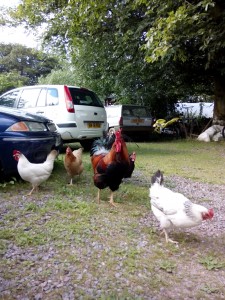
Of course there are chooks too
I’ve been working on some fascinating and really exciting projects in the meanwhile which I’ll start to share with you shortly. I’ll still be working with clients in Cardiff and all over the country, and intend to be back in South Wales every month or six weeks, so if you’re looking for an experienced and friendly graphic designer or illustrator wherever you are then do get in touch 🙂
by Frank | Jun 24, 2015 | ethics
Owing to council cuts, Grassroots on Charles Street in Cardiff, which has helped thousands of young people in crisis, is trying to raise money to maintain its services.
They have a crowdfunder here – they’ve raised £10,000 and are trying for £50,000. (more…)
by Frank | Apr 22, 2015 | ethics, illustration
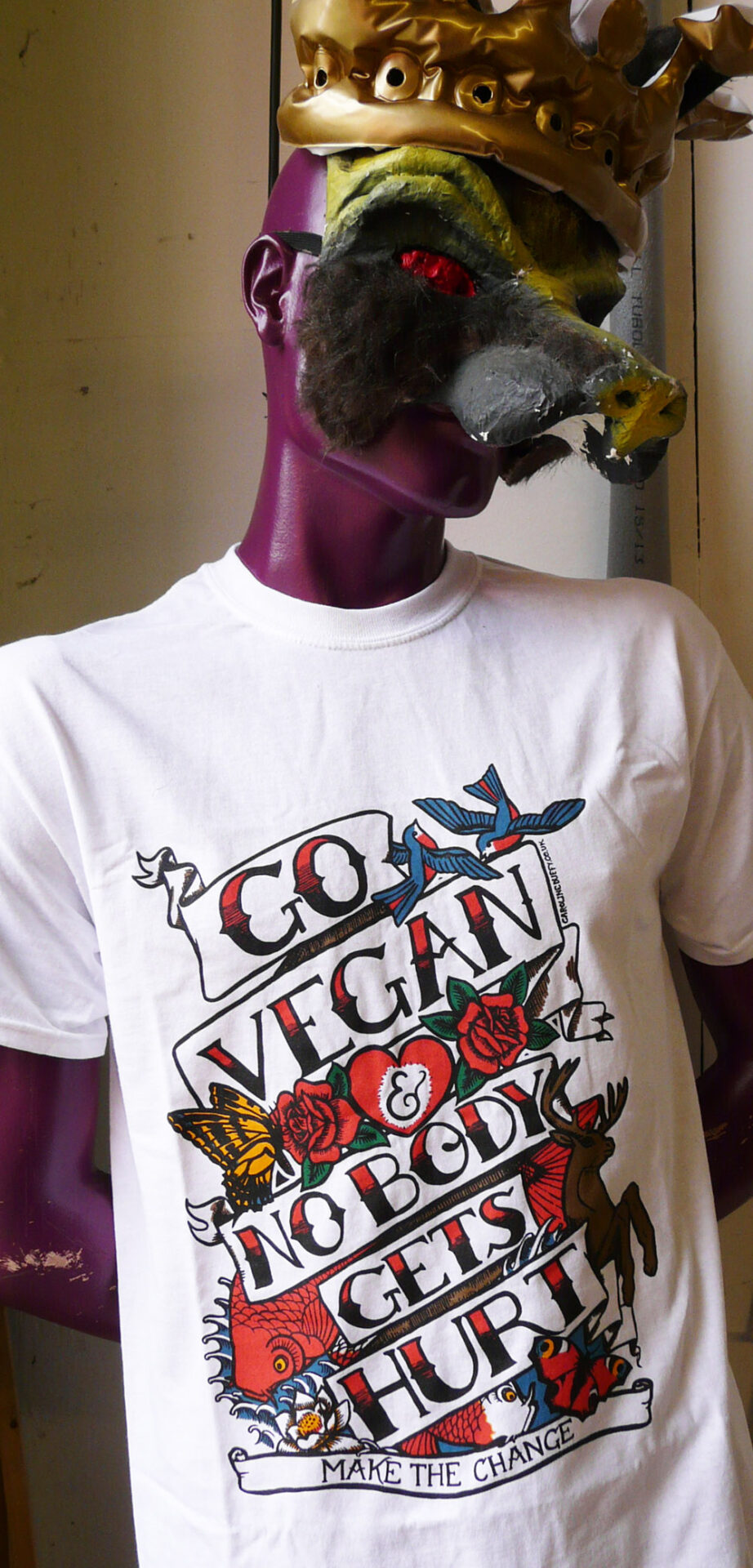 I’ve finally got around to photographing the tattoo design t-shirt I designed for the lovely Andy at Naturally Kind Foods (with a little help from Purple Wolf King mannequin at The Printhaus).
I’ve finally got around to photographing the tattoo design t-shirt I designed for the lovely Andy at Naturally Kind Foods (with a little help from Purple Wolf King mannequin at The Printhaus).
I created the illustration with some serious nodding in the direction of vintage American tattoo styles. I worked the design in pencil, inked up and then scanned, traced in Illustrator and coloured up. It was then sent off for screen printing and here it is! You can buy them here.
Edit: March 2017: I’ve created a new design and you can buy on t-shirts, hoodies, mugs and all sorts at Redbubble here
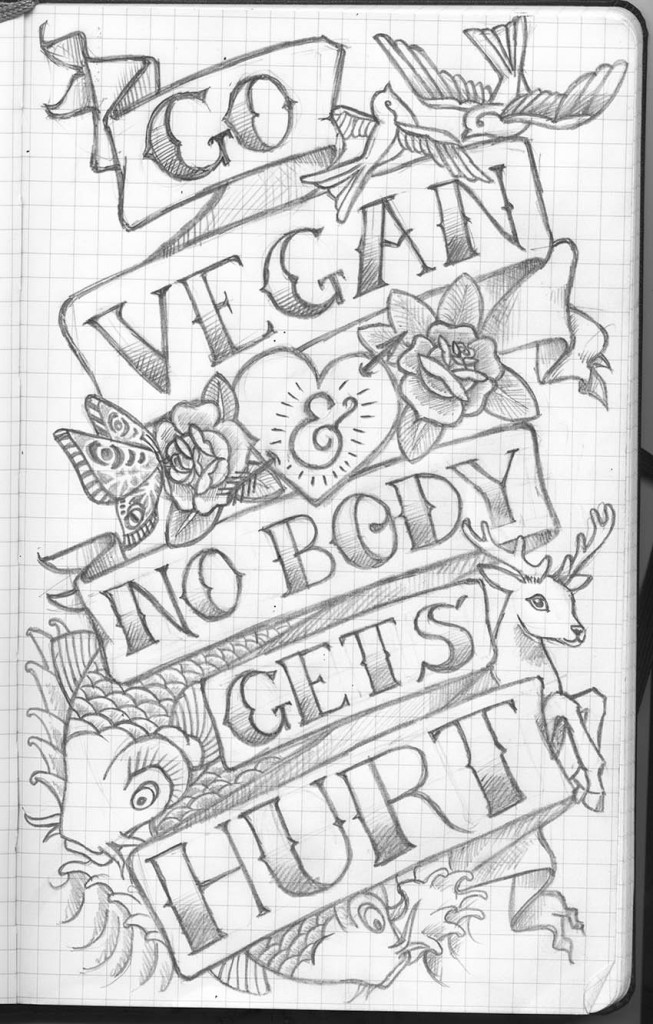
the original sketch
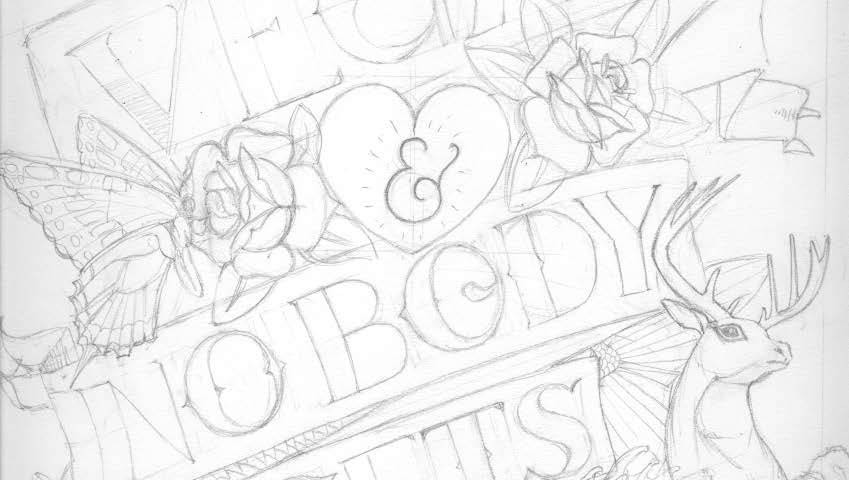
the cleaned-up pencil sketch
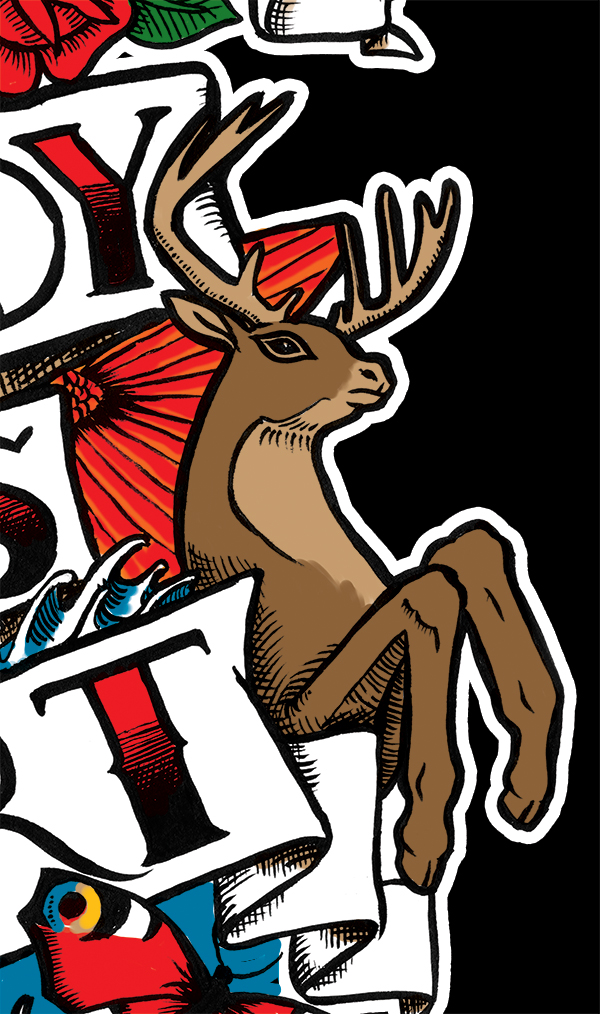
a snippet of the final design coloured up
by Frank | Jun 18, 2014 | ethics, thoughts
or, why ethics and design must go hand-in-hand if we aren’t all to score a massive own goal
Disclaimer: I’m pretty sure that everyone who knows me knows that I am not a watcher of most sport, especially football. This is mostly because of its ubiquity; the behaviour of some Cardiff City fans on match days in my locale also comes into consideration. That is not to say that I have not enjoyed a match on occasion, and the edited highlights of football games that my ex would watch on Match of the Day were tolerable and sometimes funny. However if he dragged me out to experience a whole Ireland international I would spend most of the time split between watching the condensation on my pint glass gather into droplets and stumble down to the coaster, and wishing everyone bibbling around on that stupid grassy rectangle would suffer from sudden acute narcolepsy, thus ending my suffering.
TL;DR: I find it for the most part very dull.
Nevertheless I am aware that a lot of people are very excited about the World Cup, and some of these people are my friends. And this upsets me – whether it should or not, who knows. But here is a little piece about *why* this upsets me and what design has to do with this.
Brazilians aren’t in favour of it.
It’s a thing that many Brazilians asked that we did not attend the World Cup – citing corruption by the Brazilian government and FiFA and summary executions and revenge killings OF CHILDREN in the favelas by state police as some of their reasons.
Fifa is awful awful AWFUL
It is also a thing that FIFA is a horrible monstrous beast exploiting people’s love of the “beautiful” game, and that conservative estimates state that 4,000 SLAVE LABOURERS WILL DIE in the building of the stadiums of 2022’s World Cup host, Qatar.
Now, I am a person who is for the most part pretty careful about the things they buy. I like to give money to nice fluffy organisations who look after their workers and the planet (Fairphone) and begrudge giving it to organisations who, shall we say, do not appear to prioritise these things (Apple). I boycott a lot of corporations – Nestlé, Asda, Tesco, Esso, BP, Coca-Cola, McDonalds, the meat and dairy industries, etc etc., because putting my hard-earned cashmoney into the bulging moneysacks of companies who do things that are contrary to my values seems silly.
Watching events sponsored by said companies – especially when all of the sponsors AND the organising body AND the local government have joined together in an unholy trinity of überbastardness to see who can be the most Dr Evil seems positively jawdroppingly discombobulatingly WTF.
Which is why I did not watch the London 2012 Olympics.
But of course, we’re conditioned to only care about entertainment and the immediate gratification of our desires. Who cares where those little plastic microbeads end up after we exfoliate our skin, or what happens to our watercourses after we flush bleach down the loo?
We are also told that we are just tiny little insignificant protozoa in the great Ocean of Capitalism and that nothing we do could possibly make a blind bit of difference to what the great white sharks are doing.
Well, no. Firstly because boycotts and protests work. They worked against Barclays Bank during Apartheid South Africa, they worked against Marks and Spencer who were selling intensively-reared duck meat and they have worked against Lego responded to complaints about their stupid gendered toys by bringing out a range about female scientists.
And even Apple seem to be improving their workers’ conditions.
And secondly, why would you want to partake in something where people, ACTUAL HUMANS, have been enslaved or murdered as part of the process of bringing that something to you? I just don’t get it. But then I don’t really get the point of football either, so perhaps I’m not the one to talk about this.
Moving swiftly on to something which I am a bit more qualified to talk about: so what has this little rant have to do with design, being that that word was in the subheading at the top of this?
Design is a process.
It is a process of working out what is required and then considering the most effective way of manifesting that thing. The thing at the end of said process could be anything from a brochure to an international football tournament. And every part of that process can affect the lives of all sorts of people whom you will most likely never meet and yet who live, just as you do, working to pay the rent, put food in the mouths of their families, pay for an education and to ensure that they have access to healthcare.
That process (take a brochure, for example) can also involve the cutting down of virgin forest in developing countries, or not, the use of ozone-depleting Volatile Organic Compounds, or not, and the mining and disposal of heavy metals, or not.
Design decisions matter.
This is why the decisions made at every part of this design process should be evaluated not just on what they will do for you and your organisation, but what effect they will have on the everyone – and everything – else. It’s not enough any more to not actively be an Evil Bastard – we need to check that everyone involved also has no predilection for Evil Bastardness either. Preferably, the people who are helping us Manifest our Thing are pretty much against Evil Bastardness and go out of their way, in words AND actions, to replace it with Utter Loveliness.
A wonderful example of where I think we could aim is this mission statement by clothing company Continental. I actually had a little cry when I read it. Imagine if every corporation had designed these values into everything that they did? Seriously, just take a minute and imagine that. Imagine the impact that would have on every aspect of our lives.
Imagine what THEIR World Cup would look like.
FIFA, on the other hand, seem to have designed corruption and avarice into the process of setting up their tournament. Impressively diverse ways of getting money out of the taxpayer, away from schools and hospitals and in to FIFA’s $1billion of reserves have been utilised. You’ve really got to hand it to them.
Let’s shout OFFSIDE* at them, take them as an example of how not to do things, and design a more egalitarian, co-operative world for everyone.
*I actually do understand the offside rule in football. No, I don’t know how or why either.
by Frank | Jun 6, 2014 | ethics
5 ways your business can become more sustainable at little or no cost to you
I’m assuming you’re already recycling and turning the lights off when you’re out and such because it is 2014 and these things are kind of automatic for most people now. So here are some extra ways in which you can make the planet and your pocket happy…
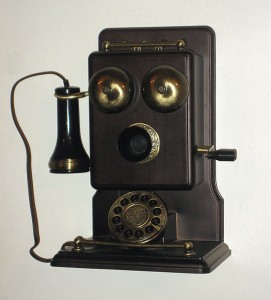
photo credit: sateda at freeimages.com
1) End of your mobile contract?
Phone still in good working order? Get a sim-only contract. Your phone contains heavy metals and minerals sourced through conflict, plus the people who made it probably didn’t have that much fun doing it. You’ll likely cut your mobile bill in half by doing this, and when your phone does start to conk out (mine is getting there at just over four years old) consider buying a Fairphone.
I saved: £240 a year
2) Switch your electricity supplier…
…to one that creates their power sustainably, and/or join a local energy co-op. Choose from Good Energy, Green Energy and Ecotricity. It means that you’re not funding nuclear or coal-fired power stations. You can compare prices easily on-line – you just need an old bill. Switching is painless these days too!
Cost me: £14 a month cheaper than the cheapest on Compare the Market – less than 50p a day to know I’m not investing in dirty energy.

3) Try having a vegan lunch once a week
We all know that animal farming produces more greenhouse gases than all transport methods combined, so cutting out meat, dairy and eggs from our diet as much as we can bear to is a Good Thing. However, I am totally aware that the very idea of an animal-free diet can send dedicated meat-hounds into cold turkey (sorry). Once a week is doable though, is it not? A quick and tasty sandwich option could be humous, sun-dried tomatoes, salad leaves and basil, and lots of chain shops do things like three-bean salads if you need to grab something on the run. Cardiff is positively bursting at the seams with places you can get a vegan lunch – check out Eat Out Vegan Wales for places in your area, and the Happy Cow website for locations nationwide. There about three zillion recipe ideas on the internet and some of the best are on The Vegan Society’s site.
Cost: nothing more than what you’re paying already
4) Switch off things that are on stand-by at the end of the day
Apparently the average cost of leaving electrical goods on standby rather than switching them off at the wall is 9% to 16% of a household’s annual electricity bill. Being that offices tend to have more things plugged in to a smaller space, you can bet it’s an even bigger proportion of your business overheads.
I work out of a home office and I have two extension leads under my desk – one that stays on because it powers the land-line and router and such, and another that can be turned off at the end of the day once my computer is off – it powers things like the mac, the display, the printer and the external hard-drive. Simple!
Saving: £50+ a year

photo credit: porah at freeimages.com
5) City car club
If like me you work from home, you may not actually need a car. If you live in a city likely there’s a nippy little hatchback just around the corner that you can hire for a small hourly rate for when you need to get to meetings. And when you’re hiring a car you’re more likely to check out what the public transport options are, too.
Adding up insurance, vehicle excise duty, MOT, servicing and the occasional fix a thirteen-year-old VW T4 needs, the camper van costs me £100 a month plus fuel, so it’s a real luxury, and I justify its ownership by the fact that I don’t take foreign holidays and I can just bugger off whenever I want and pull up in the driveway of my friend’s smallholding in West Wales and wake to the sound of wood peckers and goldfinches and chiff-chaffs.
But surely, at a cost of £1200 a year, I could easily hire vans? or hire cars and just use a tent? It’s an emotional decision to keep hold of it – I converted it to a camper myself using reclaimed wood and it has a beautiful wood burner fitted which means it’s kind of my escape pod all year round… all I’m saying is, do the maths, find out how much your car actually costs you, look up where your nearest car club vehicle is and how much that would cost.
Maybe set yourself a challenge to see if you can go without your car for a month with an amazing reward if you succeed, like dinner at IMHO the best restaurant in Cardiff, Canteen on Clifton Street?
Other options are to share the costs and responsibilities of a car with neighbours or friends (Lancaster Cohousing project has this down to a tee), or even working out how much taxis would cost you for the journeys you need to make that you can’t do by public transport. Likely that if you don’t use your car that much it’ll still save you money.
Savings: your mileage may vary!
If you can think of any other simple things to add to this list I’d love to hear your suggestions! 🙂









